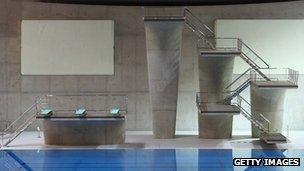London 2012: Olympic Games legacy promises under fire
- Published

The aquatics centre's design has been praised but critics fear it will not serve its post-Games purpose
The world will be watching when London hosts the Olympics next year, but once 2012 has passed will the Games have delivered the legacy promised by the organisers?
The construction phase of London's 2012 Olympic Park in Stratford, East London, is now all but complete.
The signature sweeping roofs of the velodrome and the aquatics centre and the imposing mass of the 80,000-seater stadium form the centrepieces of complex Olympics site which is, say ministers and administrators, "on time and on budget".
As landscape workers move on to the park to soften the concrete and glass with avenues of London plane trees, Olympics Minister Hugh Robertson is keen to point out the scale of the achievement.
"We were trying to build two Terminal 5s in half the time [it took], and mount a logistical operation, the size of which has never been attempted by this country outside a major world war," he says.
"It has already delivered the largest new urban park anywhere in Europe, half-a-billion pound transport upgrades to London; it's brought in its wake £1bn investment from Westfield, the largest new shopping centre anywhere in Europe. It has transformed the east end of London."
'Legal paralysis'
But while the construction has been a triumph of engineering and organisation, questions are being raised about some of the planning for the post-Games legacy.
Conservative London Assembly member Andrew Boff says: "The fact that we have been able to go from 2004 through to 2011 and we still don't know what the Olympic Stadium's going to be used for, that's shocking, absolutely shocking.
"Seven years and we still don't know who's going to be the tenant."
For Mr Boff, the much-publicised failure of West Ham's plans to take over the main Olympic Stadium highlights a wider problem with legacy planning of the Olympic Games.
First the stadium's future was to be as a scaled-down athletics venue. When that was judged economically uncertain, bids were invited from football clubs.
West Ham emerged as the preferred bidder but the decision was challenged by both Tottenham Hotspur and Leyton Orient.
With the legacy of London's Olympic stadium heading for the law courts, the government decided to intervene, says the Olympics minister.
"The whole process was getting bogged down in legal paralysis, so we took the decision in government to cut right though this, and we will retain now the stadium in public ownership and do a simple lease to whichever one comes out of the process," he says.
The decision could leave taxpayers to cover stadium running costs after the Games and with an extra £20m bill towards its conversion for football use, according to the London Mayor's Office.
Meanwhile the Olympic Park Legacy Company, external (OPLC) is currently reviewing bids from companies for management of the £270m aquatics centre once the Olympics and Paralympics have finished.
"After the Games, these become public pools so anyone can come and swim where our Olympians will have won all their medals," says Peter Tudor of the OPLC, which owns the centre.
'Most disappointing' aspect
While everyone acknowledges the design qualities of award-winning architect Zaha Hadid's building with its swooping, whale-like roof, some - including the mayor of Newham Sir Robin Wales - believe the design limits its future use:
"When it was being built we went and said 'why don't we have a leisure pool in there so we'll attract the kids, get them in the leisure pool and get them swimming - and we'll even pay for it'.
"But because of the design of the building, the roof slopes in such a way that you can't get the slides in, so it really wasn't possible to get this leisure pool in, even though we were offering to pay for it."
Sir Robin says for him this was the "most disappointing" aspect of the Olympic legacy.
The OPLC says that while fixed slides and flumes will not be possible in the aquatics centre, they will use portable, inflatable equipment to attract leisure users to the pools.
Hugh Robertson admits there is an argument that a more utilitarian structure could have been built more cheaply.
"Whether over the long-term the decision to go with the Zaha Hadid design will be the right one remains to be seen," he says.
"But there is an element at least in this of the fact that it is a fantastic facility. It's jaw-droppingly good, it's eye-catching, everybody says it's fantastic."
He said the OPLC was predicting 800,000 visitors every year.
"If you had built a more utilitarian structure, there's no particular proof that you'd get that sort of throughput," he says.
File on 4, external is on BBC Radio 4, external on Tuesday 8 November at 20:00 GMT and Sunday 13 November at 17:00 GMT. Listen again, external via the Radio 4 website or download the podcast.
- Published7 November 2011
- Published7 November 2011
- Published7 November 2011
- Published11 October 2011
- Published5 April 2011